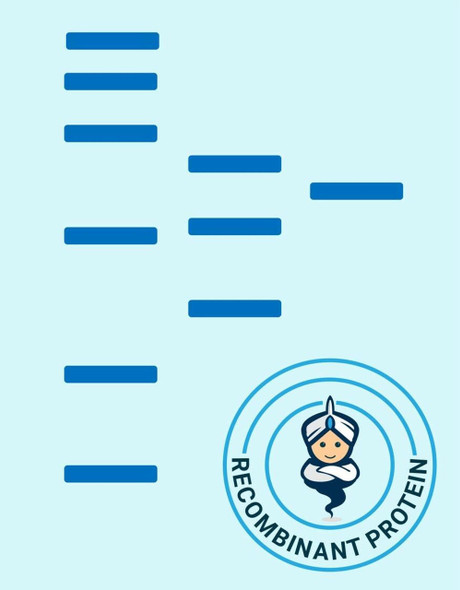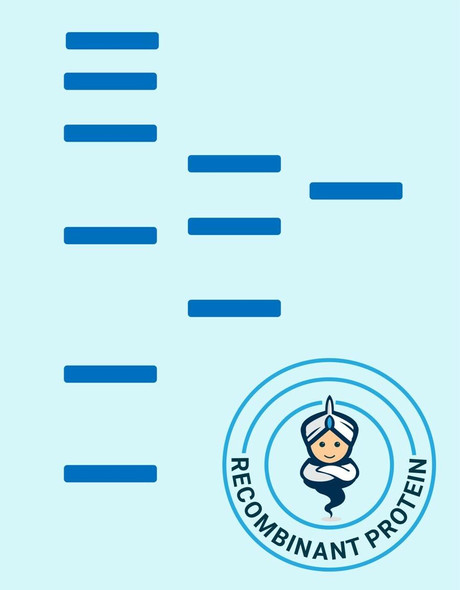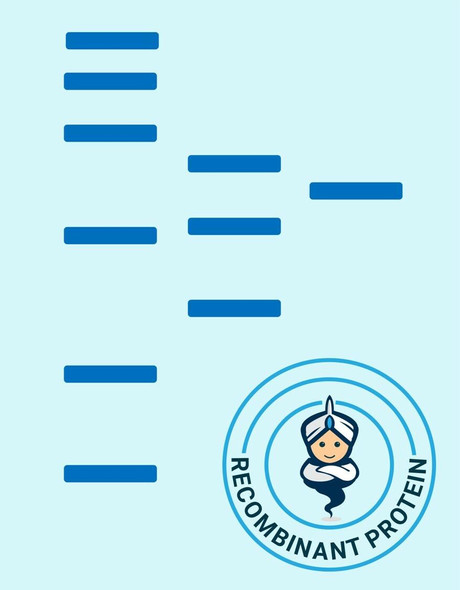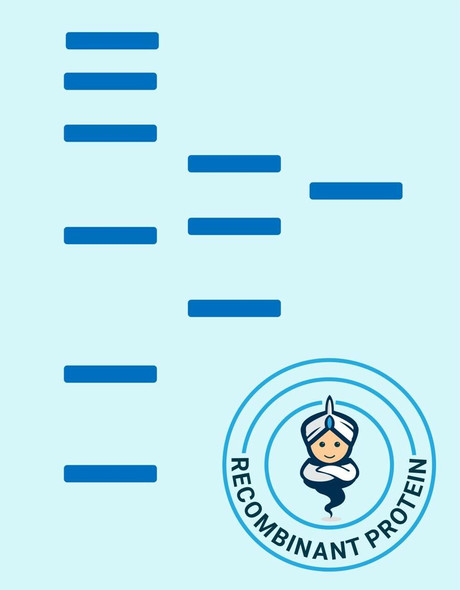Description
| Product Name: | Human KLRC1 Recombinant Protein |
| Product Code: | RPPB3802 |
| Size: | 5µg |
| Species: | Human |
| Target: | KLRC1 |
| Synonyms: | NKG2-A/NKG2-B type II integral membrane protein isoform NKG2-A, KLRC1, Killer Cell Lectin-Like Receptor Subfamily C, Member 1, KLRC1, CD159A, NKG2, NKG2A, CD159 antigen-like family member A, NK cell receptor A, NKG2-A/B-activating NK receptor. |
| Source: | Sf9 Insect cells |
| Physical Appearance: | Sterile Filtered colorless solution. |
| Formulation: | KLRC1 protein solution (0.25mg/ml) contains Phosphate Buffered Saline (pH 7.4) and 10% glycerol. |
| Stability: | Store at 4°C if entire vial will be used within 2-4 weeks. Store, frozen at -20°C for longer periods of time. For long term storage it is recommended to add a carrier protein (0.1% HSA or BSA).Avoid multiple freeze-thaw cycles. |
| Purity: | Greater than 90.0% as determined by SDS-PAGE. |
| Amino Acid Sequence: | ADPPSTLIQR HNNSSLNTRT QKARHCGHCP EEWITYSNSC YYIGKERRTW EESLLACTSK NSSLLSIDNE EEMKFLSIIS PSSWIGVFRN SSHHPWVTMN GLAFKHEIKD SDNAELNCAV LQVNRLKSAQ CGSSIIYHCK HKLHHHHHH |
Killer Cell Lectin-Like Receptor Subfamily C, Member 1 (KLRC1) is a part of the killer cell lectin-like receptor family. KLRC1 functions as a receptor for the detection of MHC class I HLA-E molecules by NK cells and some cytotoxic T-cells. KLRC1 is also connects with CD94 and is expressed on NK cells and some activated T cell.
KLRC1 Human Recombinant produced in Sf9 Baculovirus cells is a single, glycosylated polypeptide chain containing 149 amino acids (94-233a.a.) and having a molecular mass of 17.1kDa. KLRC1 is expressed with a 9 amino acids His tag at C-Terminus and purified by proprietary chromatographic techniques.
| UniProt Protein Function: | Plays a role as a receptor for the recognition of MHC class I HLA-E molecules by NK cells and some cytotoxic T-cells. |
| NCBI Summary: | Natural killer (NK) cells are lymphocytes that can mediate lysis of certain tumor cells and virus-infected cells without previous activation. They can also regulate specific humoral and cell-mediated immunity. The protein encoded by this gene belongs to the killer cell lectin-like receptor family, also called NKG2 family, which is a group of transmembrane proteins preferentially expressed in NK cells. This family of proteins is characterized by the type II membrane orientation and the presence of a C-type lectin domain. This protein forms a complex with another family member, KLRD1/CD94, and has been implicated in the recognition of the MHC class I HLA-E molecules in NK cells. The genes of NKG2 family members form a killer cell lectin-like receptor gene cluster on chromosome 12. Multiple alternatively spliced transcript variants encoding distinct isoforms have been observed. [provided by RefSeq, Jan 2015] |
| UniProt Code: | P26715 |
| NCBI GenInfo Identifier: | 317373399 |
| NCBI Gene ID: | 3821 |
| NCBI Accession: | P26715.2 |
| UniProt Related Accession: | P26715 |
| Molecular Weight: | 24,250 Da |
| NCBI Full Name: | NKG2-A/NKG2-B type II integral membrane protein |
| NCBI Synonym Full Names: | killer cell lectin like receptor C1 |
| NCBI Official Symbol: | KLRC1�� |
| NCBI Official Synonym Symbols: | NKG2; NKG2A; CD159A�� |
| NCBI Protein Information: | NKG2-A/NKG2-B type II integral membrane protein |
| UniProt Protein Name: | NKG2-A/NKG2-B type II integral membrane protein |
| UniProt Synonym Protein Names: | CD159 antigen-like family member A; NK cell receptor A; NKG2-A/B-activating NK receptor; CD_antigen: CD159a |
| UniProt Gene Name: | KLRC1�� |










